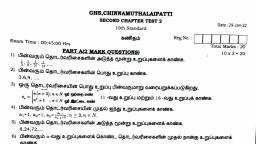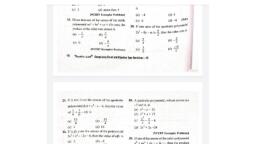Question 1 :
What is $\dfrac {x^{2} - 3x + 2}{x^{2} - 5x + 6} \div \dfrac {x^{2} - 5x + 4}{x^{2} - 7x + 12}$ equal to
Question 2 :
If $\alpha$ and $\beta$ are the zeroes of the polynomial $4x^{2} + 3x + 7$, then $\dfrac{1}{\alpha }+\dfrac{1}{\beta }$ is equal to:<br/>
Question 3 :
If $x\ne -5$ , then the expression $\cfrac{3x}{x+5}\div \cfrac {6}{4x+20}$ can be simplified to
Question 4 :
The remainder when$4{a^3} - 12{a^2} + 14a - 3$ is divided by $2a-1$, is
Question 5 :
If a polynomial $p(x)$ is divided by $x - a$ then remainder is<br/>
Question 6 :
If the quotient of $\displaystyle x^4 - 11x^3 + 44x^2 - 76x +48$. When divided by $(x^2 - 7x +12)$ is $Ax^2 + Bx + C$, then the descending order of A, B, C is
Question 7 :
Factorise the expressions and divide them as directed.$4yz(z^2 + 6z-  16)\div  2y(z + 8)$<br/>
Question 11 :
If $\alpha , \beta$ are the roots of equation $x^2 \, - \, px \, + \, q \, = \, 0,$ then find the equation the roots of which are $\left ( \alpha ^2  \, \beta ^2 \right )  \,  and  \,  \,  \alpha \, + \,\beta $.
Question 12 :
Work out the following divisions.$10y(6y + 21) \div 5(2y + 7)$<br/>
Question 17 :
Choose the correct answer from the alternatives given.<br>If the expression $2x^2$ + 14x - 15 is divided by (x - 4). then the remainder is
Question 18 :
State whether True or False.Divide: $12x^2 + 7xy -12y^2 $ by $ 3x + 4y $, then the answer is $x^4+2x^2+4$.<br/>
Question 19 :
The common quantity that must be added to each term of $a^{2}:b^{2}$ to make itequal to $a:b$ is:
Question 20 :
Find the Quotient and the Remainder when the first polynomial is divided by the second.$-6x^4 + 5x^2 + 111$ by $2x^2+1$
Question 21 :
If a root of the equations${x^2} + px + 12 = 0$ is 4 ,while the roots of the equation ${x^2} + px + q = 0$ , are the same ,then the value of q will be
Question 22 :
If$\displaystyle \alpha $ and<b></b>$\displaystyle \beta $ are the roots of $\displaystyle 4x^{2}+3x+7=0$ the value of$\displaystyle \frac{1}{\alpha ^{3}}+\frac{1}{\beta ^{3}}$ is
Question 23 :
If the roots of the equation $x^2 + 2bx + c = 0$ are $\alpha$ and $\beta$, then $b^2 - c$ is equal to
Question 25 :
$mx^2+(m-1)x +2=0$ has roots on either side of x=1 the m $\in$
Question 26 :
The equation$ \displaystyle \frac{\left ( x+2 \right )\left ( x-5 \right )}{\left ( x-3 \right )\left ( x+6 \right )}= \frac{x-2}{x+4} $ has
Question 27 :
Divide :$\displaystyle \left[ { x }^{ 4 }-{ \left( y+z \right)  }^{ 4 }\right] \ by \left[{ x }^{ 2 }+{ \left( y+z \right)  }^{ 2 }\right]$
Question 28 :
If a and b are such that the quadratic equation$\displaystyle ax^{2}-5x+c=0$ has 10 as the sum of the root and also as the product of the roots find a and b respectively











































